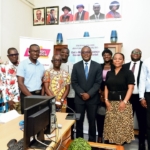Imperial General Assurance supports Korle Bu Hospital to provide 24-hour Radiology Services

The Radiology Department of the Korle Bu Teaching Hospital will soon start providing a 24-hour ultrasound services to patients who need urgent and emergency care.
This follows a donation of GHS 45,000 by Imperial General Assurance, a leading insurance provider, to the management of the Department, to support the renovation of key facilities at the hospital.
The renovation, covering plumbing, tiling, carpentry and painting works will give a facelift to the on-call room, changing cubicles and adjoining washrooms which are currently in a dilapidated state. Provision has also been made for beddings, window blinds, office table, an air conditioner, among others.

According to the Ag. Head of the Radiology Department, Dr. Hafisatu Gbadamosi, currently, an average of up to five to ten patients per week requiring urgent nighttime imaging must wait until morning.
“This delay can lead to late diagnoses and create systematic short and long term bottlenecks in the overall patient care process hospital-wide. Renovating the on-call room will allow our team to provide these critical services immediately, improving patient outcomes and streamlining our workflow. Our residents will be at the forefront of this vital service, serving as the primary point of contact for all urgent and emergency imaging needs during the night.”, she explained.

Presenting the donation at the hospital, the Managing Director of Imperial General Assurance, Mr. Harry Ofori-Attah said the project aligns with Sustainable Development Goal 3 (SDG 3)-Good Health and Well-being, which is one of the focus areas of Imperial’s Corporate Social Responsibility policy.
“This presentation marks a significant chapter in our shared commitment to advancing healthcare in Ghana. By investing in healthcare infrastructure, we are investing in the welfare of our customers and stakeholders. It is heartwarming to know that Imperial’s support will kick-start a 24-hour ultrasound service delivery,” he said.

Mr. Ofori-Attah underscored the critical role health service professionals play in society and the need for them to work in a convenient and functional environment with the peace of mind to save lives and enhance productivity.
On behalf of the hospital, Dr. Gbadamosi thanked Imperial General Assurance for swiftly responding to their request for assistance and prayed for mutually beneficial partnerships in the future. “Your assistance will directly impact our ability to provide timely and effective care to our patients, particularly during critical overnight hours.”
After the presentation, the team took a tour of the facilities to inspect ongoing renovation works which are expected to be completed in a few weeks’ time.
Imperial is a member of the African Insurance Organisation (AIO) and was adjudged the third consecutive winner of the Fastest Growing Insurance Company of the Year at the 2022, 2023 and 2024 Ghana Insurance Awards. Imperial General is a member of the Ghana Club 100, a list of the top 100 blue chip companies in Ghana.

















